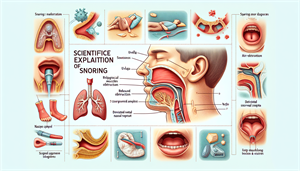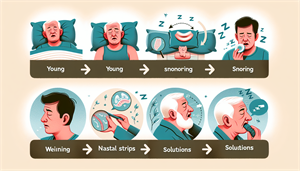
Understanding Snoring: The Science Behind It
Snoring is a common issue that impacts many people’s sleep quality. The main culprit behind this annoying and sometimes disruptive phenomenon is a restricted airflow through the breathing passages during sleep, often caused by mouth breathing. Various factors can contribute to this restricted airflow, leading to snoring. These can range from anatomical factors and sleep position to certain lifestyle habits.
Understanding snoring begins with the knowledge that our throat muscles relax during sleep. This relaxation, when coupled with a thick soft palate, chronic congestion, obesity, alcohol consumption, or back-sleeping, can limit airflow, producing the notorious snoring sound. There’s no need for despair as numerous treatments for snoring exist, and consulting sleep experts is an excellent initial step. Before that, we’ll examine the causes of snoring in more detail.
Anatomical Factors
Anatomical factors play a significant role in snoring. For instance, if you have enlarged tonsils or a deviated septum, you’re more likely to snore. The size of the tongue can also impact snoring. A larger tongue, especially if it carries excess fat, can partially block the airway while you sleep, leading to snoring. Losing weight and reducing tongue fat volume can help stop snoring and improve sleep apnea.
Another common anatomical factor contributing to snoring is nasal polyps. These small, benign growths can obstruct the sinus passages and block the nose, leading to breathing problems and, consequently, snoring due to nasal obstruction. Considering these anatomical factors is an important step in understanding why you snore and how to address it effectively.
Sleep Position
The position in which you sleep has a significant influence on snoring. For example, back sleepers may find their tongue slipping back into the throat, which narrows the airway and induces snoring. Fear not, as various strategies and devices are available to help you alter your sleep position and reduce snoring.
For example, anti-snore pillows are specifically crafted to provide neck and head support during sleep, discouraging back sleeping and promoting better sleeping posture. Similarly, adjustable beds offer the capability to raise or lower the head and foot, enabling you to sleep with your head elevated while the rest of your body remains flat. These adjustments can significantly reduce snoring and improve sleep quality.


